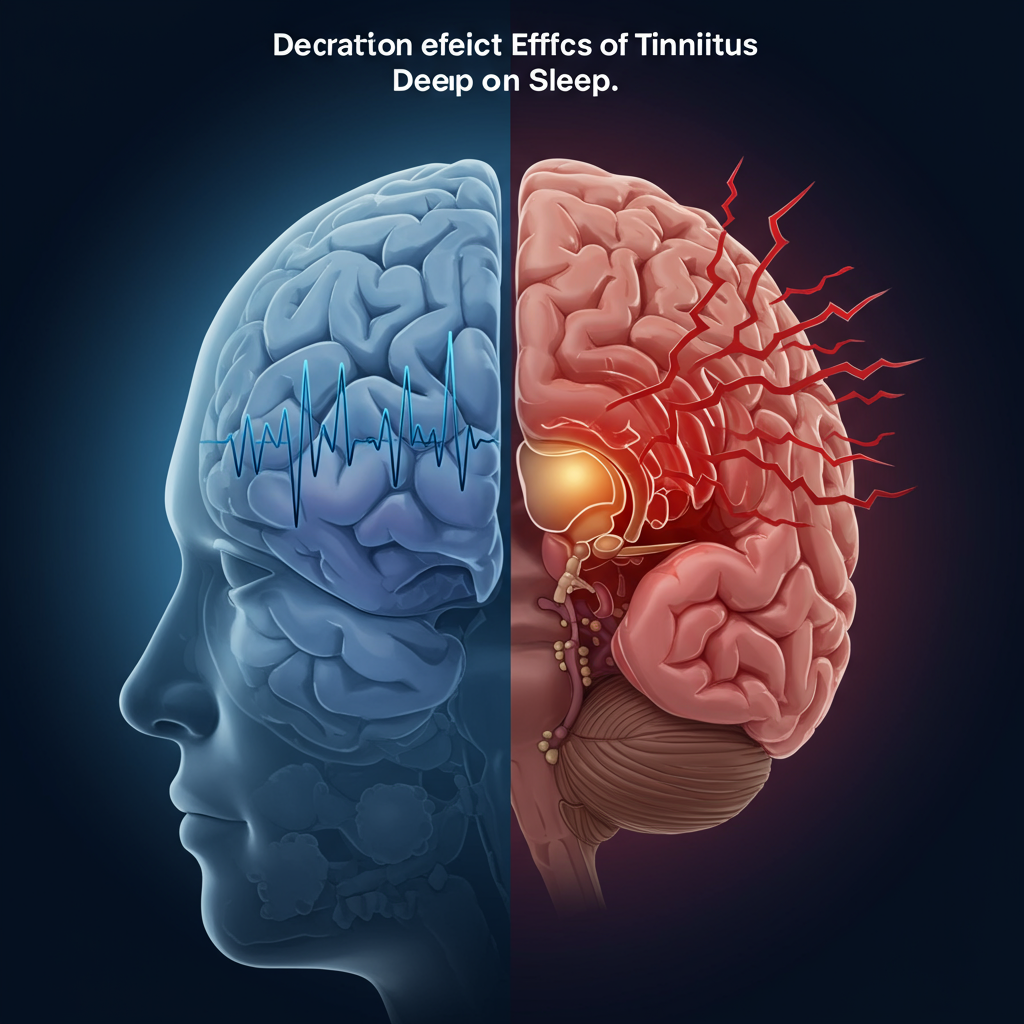Around 15 percent of people globally live with tinnitus. This condition causes the perception of sound, like ringing or buzzing, even though no external source exists. Tinnitus often coincides with hearing loss and can severely impact mental well-being, frequently leading to increased stress or depression, especially when it persists for months or years.
Unfortunately, a definitive cure for tinnitus remains elusive today. Finding better ways to manage or treat this persistent issue could provide much-needed relief to millions worldwide.
A promising area gaining significant research attention involves investigating the intricate connection between tinnitus and sleep. There are compelling reasons why sleep offers a potential key to unlocking mysteries about this phantom sound.
Understanding the Tinnitus-Sleep Connection
Researchers see sleep as a crucial biological function deeply intertwined with our perception and brain activity. The link to tinnitus appears multifaceted.
Firstly, tinnitus acts as a “phantom percept.” This means brain activity alone generates a sensory experience – seeing, hearing, or smelling something that isn’t truly there. Most people encounter such phantom perceptions primarily during sleep, often in dreams or hypnagogic states. Yet, individuals with tinnitus experience phantom sounds while fully awake, day after day.
Secondly, tinnitus significantly alters brain activity patterns. Certain brain areas, particularly those involved in processing sound, may become abnormally hyperactive. This hyperactivity could help explain how the phantom sound sensation occurs. Intriguingly, activity within these same brain regions also undergoes dramatic changes during sleep. This overlap in altered brain states provides a strong foundation for exploring a deeper connection.
Recent research, including a review by scientists at the University of Oxford, has pinpointed shared brain mechanisms underlying both sleep regulation and the experience of tinnitus. Gaining a clearer understanding of these common mechanisms and how they interact could pave the way for new strategies to manage and potentially treat tinnitus in the future.
The Critical Role of Deep Sleep
As we drift off, our bodies cycle through multiple sleep stages. One phase stands out as particularly vital for feeling truly rested: slow-wave sleep (SWS), also known as deep sleep.
During this crucial stage, brain activity moves in distinctive, sweeping waves across different neural circuits. These waves activate large networks simultaneously, including areas vital for memory and processing sounds, before moving on to others. Scientists believe slow-wave sleep allows brain cells, called neurons, to recover from the demands of the day. This recovery process is thought to be essential for restorative sleep and plays a critical role in consolidating memories.
Not every part of the brain participates equally in slow-wave activity. It is typically most pronounced in brain regions heavily used while we are awake, such as those governing motor functions or sight. However, sometimes specific brain areas can become excessively active during SWS. This phenomenon is observed in certain sleep disorders like sleepwalking.
A similar process may be happening in people experiencing tinnitus. The hypothesis is that hyperactive brain regions associated with tinnitus might resist shutting down for sleep. They could potentially remain “awake” or highly active even when the rest of the brain enters a sleeping state. This persistent activity could directly contribute to why many people with tinnitus report disturbed sleep, spend more time in lighter sleep stages, and may experience night terrors more frequently than those without the condition. Essentially, the tinnitus signal might impede the brain’s ability to generate the robust slow-wave activity needed for deep, uninterrupted rest.
The Paradox: Deep Sleep Might Suppress Tinnitus
Despite the general disruption tinnitus causes to sleep, research suggests a fascinating paradox. While overall sleep quality may suffer, the deepest stages of slow-wave sleep might actually have a suppressive effect on the tinnitus sound itself.
How might the brain achieve this suppression during deep sleep? Researchers propose a couple of potential mechanisms linked to the nature of SWS:
- Neuronal Recovery Drive: After extended periods of wakefulness and potentially heightened activity associated with tinnitus, neurons develop a strong urge to switch into the restorative slow-wave activity mode. The more neurons that collectively enter this mode, the stronger the biological drive becomes for neighboring regions to follow suit. Since this drive particularly impacts brain areas overactive during the day, the powerful collective push into SWS might be enough to override or suppress the generation of the tinnitus signal.
- Interference with Brain Communication: The strong, synchronized slow-wave activity characteristic of the deepest sleep stages has been shown to interfere with communication pathways between different brain regions. During peak SWS, this interference could effectively ‘disconnect’ or isolate the hyperactive tinnitus-related areas. By disrupting their communication with other brain circuits, the disruptive signal might be contained, preventing it from being perceived as a conscious sound and stopping it from interrupting the sleep state.
These mechanisms could explain why individuals with tinnitus can still enter deep sleep despite their condition and why the phantom sound might fade or disappear during those profound moments of rest.
Beyond immediate suppression, sleep is also crucial for strengthening neural connections, a process vital for memory formation. Scientists theorize that these very changes in brain connectivity that occur during sleep might also play a role in why tinnitus persists long after its initial trigger, such as noise exposure or hearing loss. The brain’s rewiring processes could inadvertently help “learn” or entrench the phantom sound.
Future Directions for Tinnitus Treatment
Understanding how the intensity of tinnitus fluctuates, not just throughout the day but specifically during different sleep stages, could provide direct insights into the brain mechanisms driving these changes. Tracking these variations could offer powerful clues about what the brain naturally does to alleviate or exacerbate the sound.
This line of research also opens up possibilities for manipulating sleep patterns to potentially improve the lives of patients. It could even lead to the development of entirely new treatment approaches for tinnitus. For example, techniques aimed at boosting slow-wave activity, such as carefully controlled sleep restriction paradigms where individuals only go to bed when significantly tired, could be explored. Enhancing sleep intensity in this manner might help researchers better isolate and study the impact of deep sleep on tinnitus perception.
While deep sleep is a primary focus, sleep encompasses multiple stages, including rapid eye movement (REM) sleep, each with its own unique patterns of brain activity. Future studies plan to simultaneously monitor both specific sleep stages and brain activity associated with tinnitus using sophisticated recording techniques. This combined approach could further clarify the intricate link between these two states and reveal how the brain’s natural processes might hold the key to alleviating chronic ringing or buzzing sounds.
Frequently Asked Questions
What is the main link researchers see between tinnitus and sleep?
Researchers believe tinnitus and sleep share common underlying brain mechanisms. Tinnitus is a phantom sound perception, similar to phantom experiences sometimes perceived during sleep states like dreaming. Both conditions involve altered activity in brain areas, particularly those related to hearing. Scientists hypothesize that hyperactive brain regions linked to tinnitus may disrupt normal sleep cycles, while paradoxically, deep sleep stages might suppress the tinnitus sound.
Why does my tinnitus often seem worse when I’m trying to fall asleep?
While deep sleep may offer suppression, the transition to sleep and lighter sleep stages can be challenging for tinnitus sufferers. One theory suggests that hyperactive brain regions associated with tinnitus resist entering the restful state of deep sleep. This can lead to spending more time in lighter, easily disrupted sleep stages where the contrast between external quiet and the internal phantom sound is stark, making the tinnitus more noticeable and bothersome just as you are trying to relax and sleep.
Can improving my sleep help reduce my tinnitus symptoms?
Research strongly indicates a significant connection between tinnitus and sleep quality. While deep sleep is being studied for its potential suppressive effects, disturbed sleep can worsen the perception and distress caused by tinnitus. Although more research is needed for direct sleep-based tinnitus treatments, improving overall sleep hygiene can help manage sleep disruption, which in turn may indirectly benefit tinnitus sufferers by reducing stress and supporting the brain’s natural restorative processes.
Looking Ahead
The emerging understanding of the profound link between tinnitus and sleep, particularly the role of slow-wave activity, represents a significant step forward. It moves beyond viewing them as merely co-occurring problems and points towards a shared neurological foundation. While a cure remains elusive, continued research into how sleep influences and is influenced by tinnitus offers genuine hope. By unlocking the secrets held within the sleeping brain, scientists may discover novel ways to silence the phantom sounds that plague millions, improving both their rest and their waking lives.




